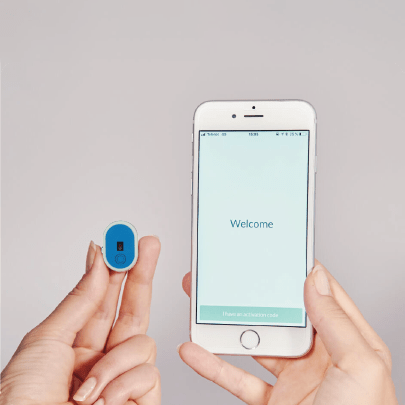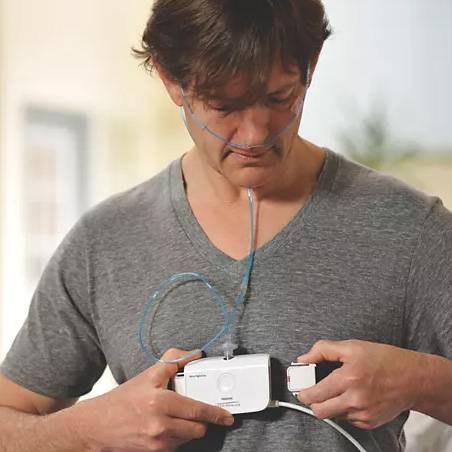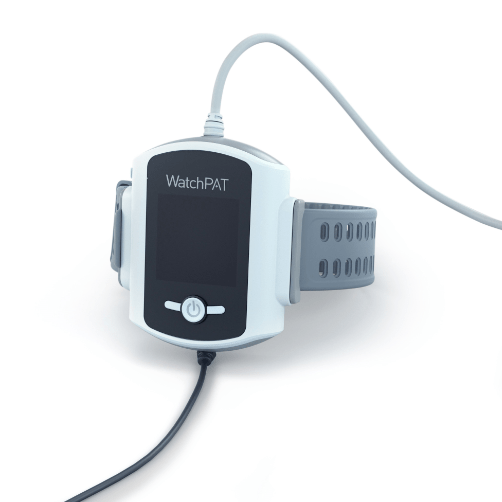Sleep Apnea Test
Getting tested at home is fast and easy. No wires. Nobody watching over you while you sleep.
Is this what you think a sleep test looks like?

Let Sleeptopia show you a better way to test.
Did you know? Home Sleep Tests (HST) have been shown to meet or exceed the efficacy of those crazy-involved, lab-based studies. A Sleeptopia Home Sleep Test is the comfortable, modern alternative to the dated, intrusive lab-based sleep study.
In-Lab Sleep Study
Cost. Intrusive. Multiple visits. Trying to sleep while in a foreign environment while being watched.
vs.
At Home Sleep Study
One night’s rest in your own bed tells your doctor everything they need to know about your regular sleep patterns.
The faster, convenient, (and, comfortable!) alternative to out-of-date sleep labs.
The Quick and Easy Choice

The NightOwl®
The smallest home sleep test on the market. Syncs to your mobile from a single finger sensor.
✓ DOT Certified
✓ FDA Approved

Alice NightOne
With your test results and diagnosis in-hand, get started with your customized sleep apnea treatment.
✓ DOT Certified
✓ FDA Approved

WatchPAT® 300
Simple and unique home sleep test that measures Peripheral Arterial Tone (PAT®)
✓ DOT Certified
✓ FDA Approved
How do I get tested for sleep apnea?
Get Rx from your Treating Doctor and upload via our handy links below.
Perform a Sleep Test at Home with Sleeptopia’s Home Sleep Test.
Doc will review results and provide a personalized report and next steps.
A Home Sleep Test is the ONLY way to go in terms of comfort, ease-of-use, economics, and overall patient satisfaction.
I'm ready to make the leap. I want better sleep.
Who benefits from HST?
- Individuals with undiagnosed sleep apnea who don’t want to spend the night away from home in a sleep lab for overnight monitoring.
- Adults age 18 or over.
- Patients who are waiting for a sleep apnea diagnosis but can’t get a nocturnal polysomnography (PSG) test due to sleep center backlog or cost.
- Anyone experiencing these unexplained symptoms of sleep apnea:
- Snoring
- Long pauses in breathing and violent snorts, gasps, or moans during sleep
- Restless sleep
- Morning headaches
- Morning sore throat or dry mouth
- Frequent awakening to urinate
- Memory impairment
- Erectile dysfunction
- Chronic fatigue
- Headaches
- Anxiety
- Depression
- Drowsy during the day
Frequently Asked Questions
Sleep studies can cause anxiety, making it hard to get proper sleep. But in most cases, the home sleep test can gather enough information for conclusive results, even if your sleep feels disrupted. If you really can’t sleep — less than 2.5 hours — you may need to retake the test.
It uses a multitude of sensors that track key metrics to show us how your body functions during sleep, including airflow, breathing, heart rate and body position.
The Itamar WatchPAT™ One uses a wrist sensor, pulse oximeter and chest sensor to track data in seven areas that measure sleep wellness — apnea events (central and obstructive), true sleep time, snoring and breathing patterns, oxygen saturation, heart rate, sleep stages, and body position. This gives us a complete view of your sleep health and what may be disrupting it.
Sleep apnea can be easily diagnosed with a home sleep test. These tests provide sufficient data for a positive diagnosis in just one night. Once you wake up, the sensor data is sent directly to a sleep physician from your cell phone. Home sleep tests will help diagnose sleep apnea but may not provide enough data for other sleep order diagnoses such as restless leg syndrome or narcolepsy.
A sleep study diagnoses sleep apnea and other breathing conditions that can disrupt someone’s sleep and overall health.
You must have a prescription to get a CPAP. In the United States, a CPAP machine is a federally regulated medical device that requires a prescription. To obtain one, you must complete a sleep study, which can be done at home or in a sleep lab.
The accuracy of home sleep apnea tests ranges between 68% and 91% depending on the type of device used and whether you are at high or low risk for having sleep apnea. The tests are significantly more accurate for people at high risk.
Experts recommend that home sleep apnea tests be taken only once. If the results are inconclusive or negative, your doctor may ask you to complete polysomnography in a sleep lab to ensure accurate results.
At-home sleep tests, like the one Sleeptopia performs, are capable of testing for obstructive sleep apnea and central sleep apnea. These tests are recommended only for people with moderate to severe obstructive sleep apnea symptoms. Those with a history of cardiorespiratory diseases, stroke, insomnia or hypoventilation should do their sleep study in a lab and not conduct an at-home sleep test.
Sleeptopia does not work with insurance companies, so any reimbursement will be at the discretion of your insurance provider. If you plan to submit the expense or the results of a Sleeptopia Home Sleep Test, you should consult with your insurance company before purchasing the test.
Home sleep tests measure important factors like breathing patterns, body position and heart rate. Data collected from the home sleep test is analyzed by a doctor to diagnose OSA.
A home CPAP test is for people who:
- Suspect they have moderate to severe OSA
- Are at higher risk for OSA
- Prefer a cheaper, more comfortable alternative to in-lab testing
An in-lab test is recommended for people who:
- Suspect their sleep issues are related to sleep disorders other than OSA
- Have a history of cardiorespiratory diseases, stroke, insomnia or hypoventilation
During your home test, you will wear a portable device that tracks important metrics about your sleep health. Your sleep study results will automatically be shared with your doctor using your cell phone’s Bluetooth. Once your doctor has reviewed your sleep data, they will confirm a diagnosis and, if diagnosed, give you a treatment plan for OSA.
Simply follow your normal day and sleep routine. In addition, stick to the below guidelines on the day of your test:
- Don’t drink any alcoholic beverages
- Don’t use any sedatives
- Avoid coffee and caffeinated beverages after lunch
- Avoid taking a nap in the afternoon
- Inform your doctor if you take medication
Pros:
- Simple and convenient — Sleep apnea home testing is comfortable and easy compared to a traditional sleep lab.
- Affordable — A sleep study test at home is cheaper than an in-clinic sleep apnea test.
- More data collection — Sleep apnea testing at home is possible for longer periods, which is beneficial as the severity of sleep apnea may vary depending on the night. In-clinic studies are done in one night.
Cons:
- Not recommended for everyone — The home sleep test isn’t for children, those with heart issues or people with mild sleep apnea.
- Less accurate — Not as much information is captured as there are fewer sensors and recording devices compared to in-clinic sleep apnea tests.
- Potential setup errors — There is no technologist to set up and observe the at-home sleep study, so potential problems with sensors could arise.
The test results of your sleep apnea test will be reviewed by a clinician. The most important items to check are the apnea-hypopnea index (AHI) and respiratory disturbance or respiratory event index (RDI or REI). These metrics represent the sleep disruption per hour. An AHI over five with symptoms or an AHI over 15 will get diagnosed as OSA.
A Sleeptopia home sleep test costs $189, which is much cheaper than in-lab, which can cost anywhere between $1,000 and $7,000.
Can I use my insurance?
We’re excited you’re ready to take the next step toward achieving great sleep. Since insurance is involved, there are a few steps we need to go through in order to see to what degree your plan will cover your test.
Once easy first step is to submit your current prescription to one of our SleepSmart Experts. Once in hand, they will run a “prior authorization” in order to determine the degree of coverage and your remaining responsibility (if any). If you’re curious if we participate with your insurance carrier, explore our list of insurance providers.
Once prior authorization has been completed, we will give you a call to discuss your options, discuss any remaining insurance-related needs, and to schedule a convenient appointment time.
Do you have Self-Pay options?
Getting a sleep test can save your life.
Most people living with this serious condition don’t even know it. Sleep apnea has been proven to lead to several serious health conditions. Getting treated reduces the risk of heart disease, stroke, depression, and other health risks.
Alright, I received the test. Now what?
Simply connect the device and head to bed. Your sleep test device will collect and report data on your sleep patterns for you. It’s so easy.
After your test is complete, simply return the kit by dropping it by our office, by mail, or hand it off to one of our SleepSmart Experts at Sleeptopia and we will get work with our network of sleep doctors to analyze and provide you results and recommendations.